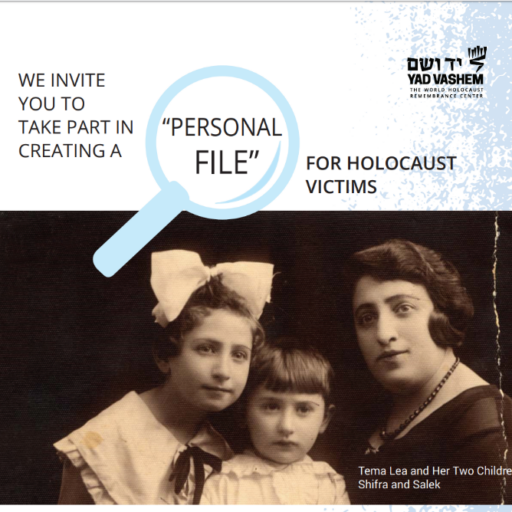New Yad Vashem Campaign Harnesses Crowd-sourcing to Create Personal Files for Holocaust Victims

While most of us had to stay at home due to the Covid-19 lockdown, EHRI partner Yad Vashem created something good out of a difficult situation and launched a unique crowd-sourcing project.
Yad Vashem’s online Central Database of Shoah Victims’ Names contains information on more than 4.8 million individuals from millions of Pages of Testimony, as well as millions of documents from the YV Archives. In fact, increasingly more data comes from the “building blocks” – the bits of information on individual Shoah victims that is gleaned from documents collected from archives worldwide. In many cases various records relate to the same person and, if they could only be grouped together, we could tell a more complete story of their life and fate.
The systematic grouping of such records into one “personal file” is complex and involves methodological and technical challenges. Yad Vashem has managed to create hundreds of thousands of such “personal files” or “clusters” that bind together several name records related to one person.
Shortly after the start of the Covid-19 shutdown, Yad Vashem launched a unique crowd-sourcing project. Following a pilot run involving Yad Vashem staff, the public was invited to actively participate in creating “personal files”. Visitors to the Names Database, can select a surname and first name (the name of a relative or simply a common name), conduct a search and identify new potential clusters of documents pertaining to one individual. They can then suggest these clusters to YV experts for approval. A convenient guide, detailing the procedure for creating a “personal file” suggestion is provided.
If the suggestions are approved, the “personal files” will be displayed in the Names Database as results about victims/people, joining the more than 320,000 “personal files” already included in the database. The information provided includes a brief text profile of the individual and his/her fate, as well the number of “name records” included in the “personal file” and a display of the documents themselves.
Between the launch of the project in mid-March and the end of May, over 27,000 suggestions for “personal files” were submitted by online Names Database users from all over the world. These are currently being processed.
Yad Vashem would like to invite you to take part in creating “personal files” for Shoah victims: Personal Files for Shoah Victims
